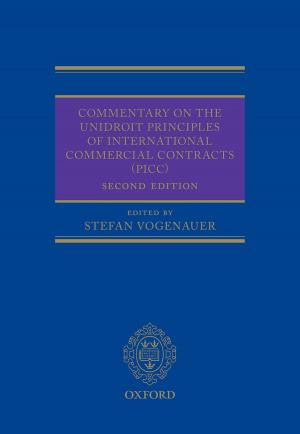China's International Investment Strategy
Bilateral, Regional, and Global Law and Policy
Nonfiction, Reference & Language, Law, International, Business & Finance| Author: | ISBN: | 9780192562425 | |
| Publisher: | OUP Oxford | Publication: | February 7, 2019 |
| Imprint: | OUP Oxford | Language: | English |
| Author: | |
| ISBN: | 9780192562425 |
| Publisher: | OUP Oxford |
| Publication: | February 7, 2019 |
| Imprint: | OUP Oxford |
| Language: | English |
Since China adopted its 'open door' policy in 1978, which altered its development strategy from self-sufficiency to active participation in the world market, its goal has remained unchanged: to assist the readjustment of China's economy, to coordinate its modernization programs, and to improve its quality of life. With the 1997 launch of the 'Going Global' policy, an outward focus regarding foreign investment was added, to circumvent trade barriers and improve the competitiveness of Chinese firms. In order to accommodate inward and outward investment, China's participation in the international investment regime has underpinned its efforts to join multilateral investment-related legal instruments and conclude international investment agreements. This collection, compiled by award-winning scholar Professor Julien Chaisse, explores the three distinct tracks of China's investment policy and strategy: bilateral agreements including those with the US and the EU; regional agreements including the Free Trade Area of the Asia Pacific; and global initiatives, spear-headed by China's presidency of the G20 and its 'Belt and Road initiative'. The book's overarching topic is whether these three tracks compete with each other, or whether they complement one another - a question of profound importance for the country's political and economic future and world investment governance.
Since China adopted its 'open door' policy in 1978, which altered its development strategy from self-sufficiency to active participation in the world market, its goal has remained unchanged: to assist the readjustment of China's economy, to coordinate its modernization programs, and to improve its quality of life. With the 1997 launch of the 'Going Global' policy, an outward focus regarding foreign investment was added, to circumvent trade barriers and improve the competitiveness of Chinese firms. In order to accommodate inward and outward investment, China's participation in the international investment regime has underpinned its efforts to join multilateral investment-related legal instruments and conclude international investment agreements. This collection, compiled by award-winning scholar Professor Julien Chaisse, explores the three distinct tracks of China's investment policy and strategy: bilateral agreements including those with the US and the EU; regional agreements including the Free Trade Area of the Asia Pacific; and global initiatives, spear-headed by China's presidency of the G20 and its 'Belt and Road initiative'. The book's overarching topic is whether these three tracks compete with each other, or whether they complement one another - a question of profound importance for the country's political and economic future and world investment governance.















